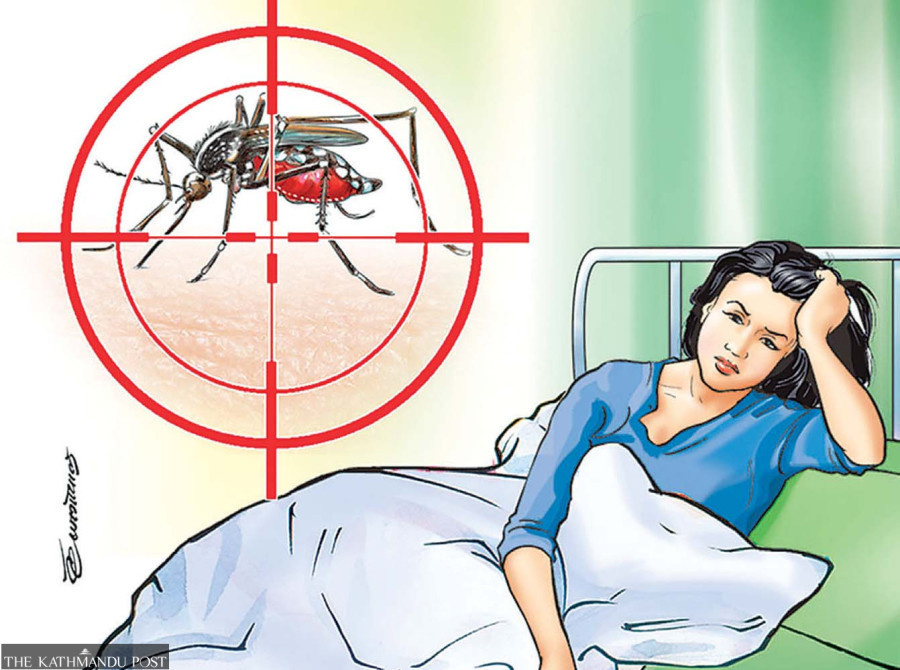Health
Health ministry sought WHO help for dengue case management
Four experts from WHO centre in Thailand imparted knowledge of case management, critical care, nursing care and on child care after severity of infection to health workers from all provinces.
Arjun Poudel
Amid a steady rise in dengue cases across the country, the World Health Organisation’s South-East Asia Region invited technical experts from its collaborative centre in Thailand to impart case management training to health workers in Nepal.
The Ministry of Health and Population had sought the help of the UN body for the same.
“The UN health agency had invited four technical experts from its collaborative centre in Thailand to impart training to our health workers upon our request,” said Dr Gokarna Dahal, chief of the Vector Control Section at the Epidemiology and Disease Control Division. “An expert team [some three weeks ago] imparted knowledge of case management, critical care, nursing care and how the infected children are to be taken care of to the health workers from all the provinces.”
At least one person has died and more than 2,500 people across the country have been infected by the dengue virus, as of Friday. Cases of infection from the virus have been reported from around 70 districts, including from mountainous ones, namely Sankhuwasabha, Myagdi and Darchula. Officials say most cases have been reported from Dharan of Sunsari, and Dhading and Kaski districts. All three districts of the Valley have reported dengue cases.
Dengue is a mosquito-borne disease transmitted by female Aedes aegypti and Aedes albopictus mosquitoes. The same vector also transmits chikungunya, yellow fever, and Zika, according to the World Health Organisation.
According to doctors, mild to high fever, severe muscle pain, rashes, severe headache and pain in the eyes are some of the symptoms of dengue. Doctors advise that those experiencing these symptoms should immediately seek treatment. While there is no specific cure for the disease, early detection and access to proper medical care can lower fatalities.
Dengue-transmitting mosquitoes breed in clean water and bite people in daylight. Uncovered water tanks and discarded objects such as plastic cups and bottles could be breeding grounds for dengue-carrying mosquitoes.
Officials at the Epidemiology and Disease Control Division said that most of the cases were reported in June and July.
Experts say that the real number of infections could be several times higher, as the government’s case reporting system is not very effective and more than 80 percent of the cases are asymptomatic. Many people infected with the dengue virus exhibit mild symptoms, which do not need any treatment or get treated with paracetamol, at home.
Last year, 88 people died and more than 54,000 were infected with the virus, which had spread to all 77 districts of the country. Hospitals in Kathmandu Valley were overwhelmed with dengue patients and many complained that they were deprived of treatment. At the time, pharmacies had run out of paracetamol, the most widely used medicine to treat fever.
The number of deaths from dengue infection in Nepal is considered very high.
In 2019, the disease gripped 68 districts; six people died, and more than 16,000 were hospitalised.
“This year too, hospitals have reported severe dengue cases,” said Dahal. “If the number of cases continues to rise in the coming days, serious cases will rise too.”
Although the post-monsoon time is considered the peak season for dengue
transmissions, the country has already witnessed outbreaks of the potentially deadly disease since the start of the year. Experts say the virus has become endemic with cases of dengue infection being reported throughout the year.
As there is no specific treatment for dengue infection, experts have been urging authorities concerned to enforce preventive measures. However, enforcing preventive measures is primarily the responsibility of the local units.
Local governments get up to 90 percent of their health budgets from the federal government and their role is crucial in controlling any outbreaks.
“We are going to Dharan on Saturday for a meeting to sensitise elected representatives about the risks,” said Dahal. “Everyone’s role is important in controlling the spread of the dengue virus, but the role of the local units is even more crucial.”




 9.8°C Kathmandu
9.8°C Kathmandu















